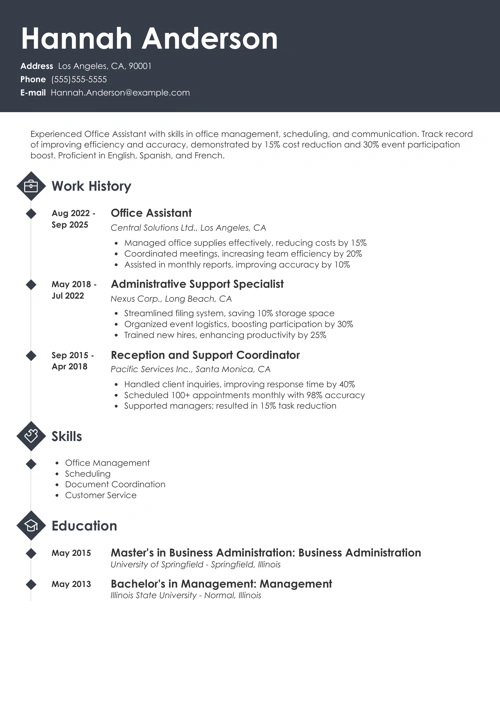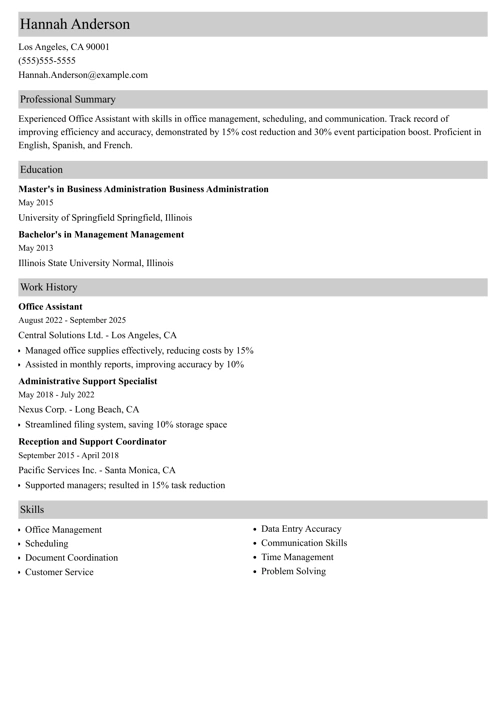Oh, the controversy over resume spelling. Is it resume, or résumé? Or maybe resumé? And all it comes down to is an accent or two.
Don’t worry. We have the answers and actionable advice for language nerds, the curious, and the worried jobseekers, giving you the definitive verdict on how to spell resume, once and for all.
In this article, I’ll show you:
- What dictionaries say about the correct spelling of resume.
- Where those little accent marks above “e” come from.
- What spelling employers expect from jobseekers.
- And how to type resume résumé in Word and other software.
Want to save time and have your resume ready in 5 minutes? Try our AI resume builder. It’s fast and easy to use. Plus, you’ll get ready-made content to add with one click. See 20+ resume templates and create your resume here.
Sample resume made with our builder—See more resume samples here.
1. Resume Spelling: What Dictionaries Say and Where the Word “Résumé” Comes From
The word résumé (two accents intended) comes from French and means summary.
But the French themselves don’t use this word when referring to application documents.
They use un CV or curriculum vitae.
The word résumé, as in: a one- to two-page document that summarizes a job seeker's qualifications, is chiefly used only in the US and Canada. But the difference between a CV and a resume is a completely different kettle of fish.
How about those pesky accent dashes in résumé though?
English doesn’t normally use accent marks (diacritics). We usually find them in foreign words.
Here’s what go-to dictionaries say about the word:
- Merriam-Webster’s Dictionary: all forms of the word are acceptable, but, resumé is considered the least common.
- Oxford Advanced American Dictionary: suggested noun—résumé. That entry suggests alternatives such as resumé, resume. All three spellings are correct.
- The American Heritage Dictionary: “résumé or resume or resumé.”
- Wiktionary: all three variants are listed. However, there’s a note about all three being “occasionally contested.”
- And last but not least, Essential American English Dictionary by Cambridge. The entries résumé and resume are listed as interchangeable. However, there is no mention of the word resumé (final accent only)!
And as for common style guides:
- Chicago Manual of Style: advises preserving the accents in borrowings.
By popular vote, resumé comes in last with least backing.
So, what's the bottom line? Is it resume, résumé, or resumé?
Now, let’s play devil’s advocate and talk about the two spellings of resume with accents.
Making a resume with our builder is incredibly simple. Follow our step-by-step guide, use ready-made content tailored to your job and have a resume ready in minutes.
When you’re done, our AI resume builder will score your resume and our resume checker will show you exactly how to improve it.
2. Is It Résumé or Resumé?
Let’s find out what the differences are.
Résumé
Now, how about résumé with the accent on the first and the last “e”?
It follows the tradition of leaving accents in loan words. It’s 100% grammatically correct and makes it clear what word you’re using, the noun or the verb (as in: Resume writing your résumé.)
Also, the word looks professional, especially in an academic or linguistic context. But—
The truth is the double-accented version is rare in other contexts and can therefore come across as pretentious. So:
Résumé—correct but overkill.
Resumé
The argument in favor of resumé goes:
The final accent mark differentiates the noun from the verb “to resume.” It also directs you towards the correct pronunciation of the word: re-zoo-may—
Since many English words end with a silent “e," “é” (with the accent mark) will make you read it out. But—
This is a useful disambiguation… when playing charades. (And you might as well go with two dashes then!)
Resumé—not recommended.
Note: Résumé and resumé get the acute accents also known as accent aigu (dash above “e” bowing to the right—high pitch pronunciation) not the grave accents (dash bending to the left—low pitch pronunciation). Don’t confuse the two. Plus, remember the acute accent is not the same as apostrophe: (´) vs (').
How to Type Resume in Word and Other Software to Get Résumé with Accents
- Unicode: (works anywhere in Windows, including MS Word): Alt 0233 = é (use the numeric keypad on the right of your keyboard and not the numbers at the top; on laptops without a keypad, turn on Num Lock and use the function key plus the virtual number pad).
- Mac: Option-e + e = é.
- To type resume in Word hit CTRL + '(Apostrophe) + e = é.
- No shortcuts for Google Docs but go to Insert > Special characters > Latin > é.
- Alternatively, just type resum, have the software mark this as a mistake, and click to corrent (thanks for the suggestion in the comments!)
And you can always copy-paste the correct version of the word to reuse it in your document. Any plain text editor will do the work.
Pro Tip: It’s easy to confuse resumé with résume (accent on the first “e”). Résume exists in French but not in English. Don’t use this form as it’s a mistake.
3. The Most Common “Resume” Spelling and Why It’s Fine
The most common and correct spelling of resume is resume. Let’s not complicate things:
Clarity matters, but there’s being precise, and then there’s being unnecessarily precise.
The form resume:
- Is a loanword, and loan words evolve across time.
- Is standard and common in the US and Canada: non-accented words look more natural.
- Is more practical: no need for special code and no risk encoding bugs will turn résumé into r?sum?.
Despite all the grammatical intricacies “resume” with no accent beats the other forms of resume with accents.
Pro Tip: Use a PDF resume format. This way you can be sure the hiring manager sees your original formatting, even if you used special characters for the word “resume.”
One more thing.
Be smart—if the job posting says "send us your résumé,” follow their lead and use the same form in all your application documents.
And remember: the choice of the word won’t really affect the recruiter's decisions, but inconsistency can.
Plus, a great cover letter that matches your resume will give you an advantage over other candidates. You can write it in our cover letter builder here. Here's what it may look like:
See more cover letter templates and start writing.
Key Takeaway
- When it comes to proper resume spelling—resume, résumé or resumé—they are all grammatically correct, however, resumé is the least common.
- Be careful when using the accented form résumé—it may be considered hypercorrect.
- Be consistent. Choose one form of the word and use it throughout your email communication with the recruiter.
- Don’t complicate things—“resume” is simple and commonly used. You’ll avoid technical issues and you won’t need to sweat anymore.
About Zety’s Editorial Process
This article has been reviewed by our editorial team to make sure it follows Zety's editorial guidelines. We’re committed to sharing our expertise and giving you trustworthy career advice tailored to your needs. High-quality content is what brings over 40 million readers to our site every year. But we don't stop there. Our team conducts original research to understand the job market better, and we pride ourselves on being quoted by top universities and prime media outlets from around the world.





